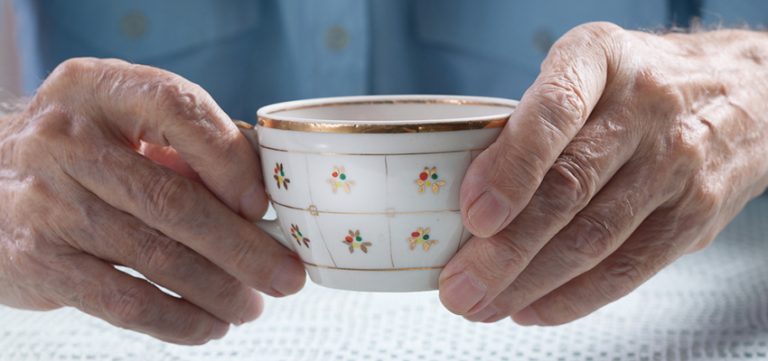There’s no Place Like Home: Home-Like Environments in Aged Care Facilities - about the dilemmas nurses face when supporting residents' free choice and decision-making when the action they wish to take is contrary to a non-nurse health professional's clinical assessment and recommendations. The main thrust of the article is about being commonsensical in such decisions so that the resident can experience joy in their final years, even if that joy comes with an element of risk.
Over the last few months, I have witnessed three residents being referred to a speech pathologist (SP) for coughing during and/or following drinking or eating. On each occasion, the SP recommended thickened fluids (and a softer diet), which was refused on the first serving or within the first 48 hours.
Consider this scenario.
Frank is a cognisant 96-year-old war veteran of English descent. He fiercely enjoys his cup of hot, sweet white tea for breakfast, lunch and dinner, along with three smokes.
The care staff called me over to him saying he was upset and had refused his food and fluid for all of the morning, and most of the evening before. I found Frank very distressed, and he begged of me, '…sister, all I want is a bloody cuppa tea. Not this muck. A man may as well be dead…' The 'muck' he was referring to was a plastic tumbler of thick, caramel-coloured, lukewarm fluid. This was an L1 cup of tea.
The outcome for Frank was that he finally got a cup of thin-fluid tea, after 35 minutes of:
- Gaining informed consent from him, ensuring he understood the risks
- Gaining informed consent from his son (next of kin) per speakerphone, ensuring he also understood the risks
- A nurse witness to these conversations, which we documented in Frank's notes, both of us signing
- Frank being supervised to sit fully upright and use a chin tuck for each swallow
- Last but not least: a very happy Frank.
Another outcome, however, was that when the visiting SP returned a week later, she was concerned that an RN (me) had overridden her recommendations. The SP's fear was that the RN (me) had increased Frank's risk of aspiration, which she had previously lessened by assessing and formulating recommendations, at yet another RN's request. Her concern, and rightly so, was why make the initial referral in the first place?
So, what have we got here?
- A clash between two health professionals, each with cognitive authority over their knowledge domain, but not of each other’s? Or,
- Either profession claiming the right to act as primary decision-maker for Frank?
Actually, what we have here, is just Frank, who has the right to make informed decisions and indulge in (reasonable) risk-taking.

To guide our support for Frank's case to continue enjoying his regular fluid tea, we nurses considered each of the following:
- As above, the notion of informed consent (in civil law, what we must do)
- The use of an ethical decision-making framework (what we ought to be doing)
- The Charter of Residents' Rights in Healthcare (what we should be doing), and
- With no disrespect towards the SP, our deliberations as follows:
- Her decisions are recommendations: they are not law, and Frank has the right to refuse.
- Although the SP gained verbal consent for the assessment, it is not documented that she then offered a trial of the thickened fluid for him to taste, allowing him to understand what he was in for and thereby gaining his compliance or refusal at the outset (had this been done, a waste of time and upset could have been averted).
- The SP had a snapshot view of Frank on that day, for that singular problem on which to base the recommendations.
- Our ‘view’ of Frank can be likened to a 5-year-running reality movie. We know the whole person that Frank is.
I am not trying to make this residential aged-care issue into something bigger than Ben Hur, nor am I wanting to trivialise the event as merely 'a storm in a teacup'. But, I believe that some professionals (nurses included) are becoming overly cautious and overly protective - not so much of the resident and their wants, but of their registration. I believe - and I am confident - that following the appropriate guidelines, as mentioned above, acts as my defence against any potential reporting/investigation by AHPRA.
What I would like to see is:
- The cessation of to-ing and fro-ing between nurses and non-nurse professionals who should be working a little closer together
- The cessation of repeated referrals to the same non-nurse professional, over the same issue, because the residents refuse to or cannot comply
- The inclusion of the resident in understanding the meaning of the recommendations, (that is, what they are 'in' for)
- And for nurses (especially the care staff), an increase in their knowledge base of how normal ageing affects the cough and swallow reflex, and what to expect; the difference between a normal clearing of the throat cough and an episode of coughing with the threat of aspiration; the difference in signs/symptoms between forcibly coughing to clear a partially blocked airway (resident pink in the face and can still speak) and choking (resident turning blue, cannot speak and perhaps clutching at the throat), and finally
- Ensuring that aspiration preventative measures are part of the normal routine for all residents, such as: sitting upright for meals and 'smokos', surveillance at mealtimes, performing a chin tuck, taking small sips at a time, remaining upright for 30 minutes post food or fluid consumption, and importantly, performing oral hygiene after meals where the mouth is rinsed clear of residual food and/or fluid.
The above is a discussion of how we worked through our situation. It is in no way intended that other aged care facility staff follow suit. You have your own processes to follow. However, what is clear is that making such decisions requires the input of several parties, working together (don’t forget the resident!), and with reference to relevant guiding documents, including your facility's policies.
